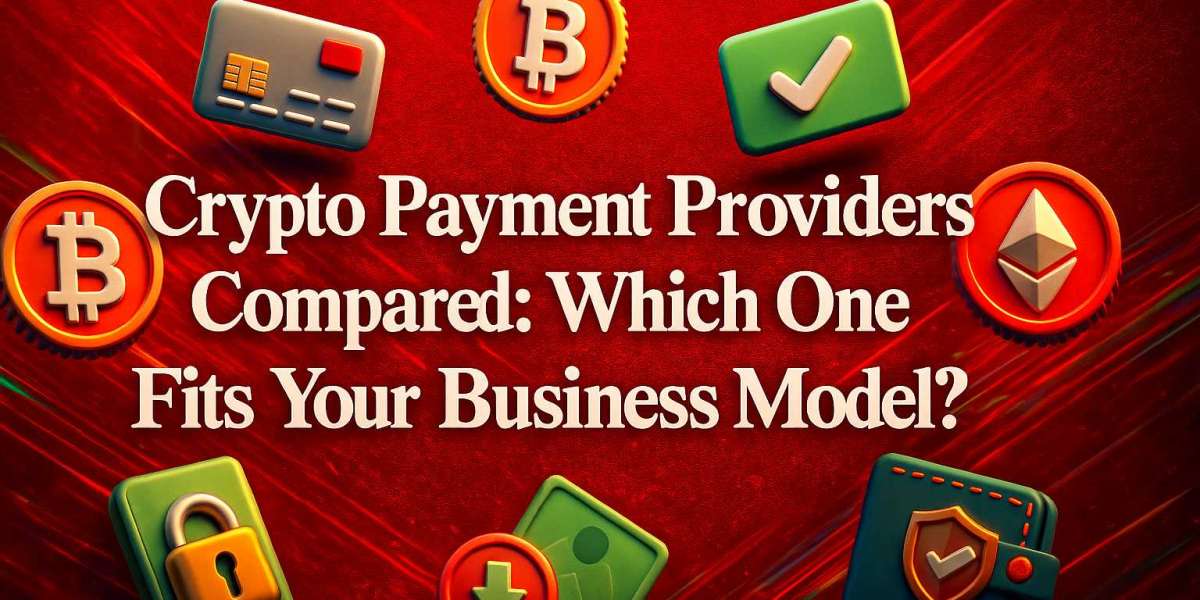As global digital commerce expands, businesses of all sizes—from e-commerce brands and SaaS companies to Web3 startups and fintech innovators—are rethinking how they accept and manage payments across borders. Traditional payment gateways have become slow, expensive, and unreliable for global transactions. Cross-border fees remain high, settlement times are still measured in days, and card payment failures are common in many regions.
In contrast, Crypto Payment Providers are emerging as the new standard for fast, low-cost, borderless transactions. They enable businesses to accept cryptocurrencies and stablecoins, settle globally in minutes, and tap into new markets without needing local banking relationships.
But with dozens of Crypto Payment Providers in the market—each offering different features, integrations, security standards, and compliance frameworks—the real challenge is choosing the right one for your specific business model.
This article provides a comprehensive, business-model-focused comparison to help you decide which Crypto Payment Provider best fits your needs.
What Are Crypto Payment Providers (and Why They Matter Now)?
Crypto Payment Providers are platforms that allow businesses to accept, process, and settle payments in cryptocurrencies and stablecoins. They operate similarly to traditional payment gateways, but with blockchain rails that offer global accessibility, faster settlement, and lower fees.
Key capabilities of Crypto Payment Providers include:
Accepting crypto stablecoin payments
Supporting multiple blockchains
Converting crypto to fiat instantly
Facilitating global payouts
Integrating wallet-based checkout
Offering APIs, plugins, and SDKs
Providing compliance, KYC/AML, and reporting tools
Securing funds with custodial or non-custodial models
Crypto Payment Providers matter because they solve pain points that traditional providers cannot:
Faster global settlement
Lower transaction fees
Borderless accessibility
Better approval rates
More flexible payment options
Key Features to Compare Across Crypto Payment Providers
Choosing the right provider requires evaluating features that directly impact your operations, customer experience, and global reach.
Below are the most important comparison points.
1. Supported Cryptocurrencies Stablecoins
A strong Crypto Payment Provider should support:
Major assets (BTC, ETH)
Popular stablecoins (USDT, USDC, PYUSD, DAI)
Additional tokens depending on your market
Why this matters:
Stablecoins reduce volatility
Global customers prefer different assets
More currency options = higher conversion rates
2. Supported Blockchains Fee Structures
The blockchain network determines:
Speed
Gas fees
Scalability
Common chains supported:
Ethereum
Polygon
Tron
Solana
Arbitrum
BNB Chain
Avalanche
Why this matters:
Some blockchains have cheaper fees (Polygon, Tron)
Others offer faster settlement (Solana, Layer-2 networks)
Your users may prefer specific ecosystems
3. Checkout Experience Wallet Integrations
The user experience during checkout directly affects conversion rates.
Top wallet integrations:
MetaMask
Coinbase Wallet
WalletConnect
Phantom
Trust Wallet
Provider differences include:
Hosted vs on-site checkout
One-click payment flows
QR code payments
Mobile wallet deep linking
E-commerce plugins for Shopify, WooCommerce, Magento
4. Settlement Options (Crypto, Stablecoin, Fiat)
Businesses should choose providers that offer settlement options that match their treasury strategy.
Typical options:
Settle directly in crypto
Convert instantly to stablecoins
Convert instantly to fiat
Hybrid settlement (percentage split)
5. Compliance, KYC/AML Licensing
Crypto payments must still meet global regulatory standards.
Look for providers offering:
Merchant-level KYC
Automated AML checks
Travel Rule compliance
Region-specific licensing (EU, UK, UAE, USA)
This is essential for:
SaaS
Marketplaces
Regulated industries
Fintech products
6. Fees, Pricing Models Hidden Costs
Every provider has unique pricing. Compare:
Transaction fees
Network fees
Conversion fees
Payout fees
Monthly or integration fees
Chargeback-related fees (or lack thereof)
Crypto payments generally have:
Lower fees
No chargebacks
No FX surcharges
But it’s still important to understand each provider’s model.
7. Developer Tools, APIs Ease of Integration
Crypto Payment Providers must offer strong developer support.
Look for:
Clean documentation
SDKs for JS, Python, Go, etc.
Sandbox environments
Webhooks for event notifications
Plugins for popular platforms
High-quality developer tools reduce integration time dramatically.
8. Security Standards Risk Controls
Security is critical in crypto.
Security features may include:
Custodial or non-custodial wallet models
Multi-sig wallets
Cold storage for funds
DDoS protection
On-chain transaction monitoring
Third-party security audits
Choose providers with a proven security track record.
Crypto Payment Providers Compared: Which One Matches Your Business Model?
Instead of listing providers by brand, this section compares provider types and helps you determine which fits your business model.
1. Best Crypto Payment Providers for E-Commerce Businesses
Businesses in e-commerce need:
Fast checkout
Stablecoin support
Auto-conversion to fiat
Easy integrations
Ideal provider type features:
Shopify, WooCommerce, BigCommerce plugins
Low fees for cross-border sales
Wallet-native payments
QR-based checkout for mobile shoppers
Integrated settlement options
Why this matters:
E-commerce merchants want to reduce cart abandonment and access underbanked customers globally.
2. Best Crypto Payment Providers for SaaS Subscription Platforms
SaaS companies require:
Global reach
Reliable recurring billing
Stablecoin payment support
High authorization rates
Ideal provider type features:
Tools for recurring crypto payments
Stablecoin-focused billing systems
Automated invoicing
Global customer access
APIs for subscription management
Why this matters:
Failed cross-border payments reduce recurring revenue—crypto reduces those failures.
3. Best Crypto Payment Providers for Web3 Startups DApps
Web3 projects need:
Wallet-native checkout
Multi-chain support
Smart contract interactions
Ideal provider type features:
MetaMask WalletConnect integrations
Deep blockchain compatibility
Low-cost Layer-2 payment options
On-chain settlement
NFT and token payment support
Why this matters:
Web3 users expect a wallet-first transaction experience, not traditional checkout flows.
4. Best Crypto Payment Providers for Marketplaces Global Payout Platforms
Marketplaces need:
Multi-party payout support
KYC/AML for sellers
Stablecoin payout options
Ideal provider type features:
Automated seller onboarding
Seller-specific KYC
Mass payout tools
Stablecoin or fiat global payouts
Detailed transaction reconciliation
Why this matters:
Marketplaces must balance compliance, speed, and accuracy—crypto simplifies payouts globally.
5. Best Crypto Payment Providers for Fintech Platforms Neo-Banking Products
Fintech products need:
Strict compliance
Strong APIs
Reliable settlement infrastructure
Ideal provider type features:
End-to-end compliance stack
White-label payment APIs
On/off-ramp capabilities
Ledger tools and reconciliation features
Why this matters:
Fintechs require enterprise-grade tools and stable regulatory footing.
6. Best Crypto Payment Providers for High-Risk Industries
These industries include:
Gaming eSports
Forex trading platforms
Digital goods
Online learning
Certain subscription products
Ideal provider type features:
No chargebacks
Global reach without card restrictions
Risk-resistant transaction flows
Why this matters:
Traditional processors often block or overcharge these industries—crypto unlocks new revenue channels.
Side-by-Side Comparison Table: Crypto Payment Providers by Business Model
Below is an example conceptual comparison (without naming brands) to support clarity and SEO:
| Business Model | Best Provider Type | Key Needed Features | Settlement Options | Compliance Level | Integration Difficulty |
|---|---|---|---|---|---|
| E-commerce | Checkout-focused provider | Plugins, stablecoins, auto-fiat | Crypto, fiat | Medium | Low |
| SaaS/Subscriptions | Recurring billing provider | Stablecoins, automation | Stablecoins | Medium | Medium |
| Web3 Startups | Wallet-native provider | Multi-chain, wallets | Crypto | Low/Medium | Medium |
| Marketplaces | Payout provider | KYC, mass payouts | Stablecoins | High | Medium/High |
| Fintech Platforms | API-first provider | Compliance tools | Fiat, stablecoins | High | High |
| High-Risk Sectors | Risk-tolerant provider | Global access | Stablecoins | Medium | Low |
How Crypto Payment Providers Compare to Traditional Payment Gateways
Where traditional gateways struggle:
High declined transaction rates
Slow settlement (T+2 to T+7)
Expensive cross-border fees
Chargebacks and fraud
Limited global coverage
Where Crypto Payment Providers excel:
Instant or near-instant settlement
Low transaction fees
Global, borderless access
24/7 availability
Wallet-native checkout
Zero chargebacks
Many businesses choose a hybrid strategy, using both traditional and crypto providers to maximize reach.
How Our Platform Helps Businesses Choose the Right Crypto Payment Providers
Your platform:
Displays verified Crypto Payment Providers
Includes detailed business-model-focused comparisons
Provides filters for features, geography, assets, and fees
Helps businesses quickly find the right provider
Bridges service seekers with trusted crypto payment partners
This reduces research time, improves decision-making, and increases conversion for both sides.
Risks Challenges to Consider When Choosing Crypto Payment Providers
While crypto payments offer powerful advantages, businesses must consider:
Regulatory changes across countries
Stablecoin adoption differences
Network congestion on certain blockchains
Treasury management challenges
User familiarity with crypto wallets
How top providers mitigate risks:
Auto-conversion to fiat
Multi-chain routing
Strong compliance frameworks
Educational checkout interfaces
Enterprise-grade security
Case Studies: How Businesses Choose the Right Crypto Payment Providers
1. E-commerce Brand Expanding to LATAM
Required stablecoin support
Needed low-fee cross-border payments
Chose a checkout-focused provider
2. SaaS Company Improving International Renewals
Adopted stablecoin billing
Automated subscription payments
Reduced failed payment rates
3. Web3 Marketplace Scaling Globally
Selected multi-chain wallet-native provider
Enabled wallet-based NFT purchases
Improved operational efficiency
4. Freelancer Marketplace Offering Global Payouts
Chose stablecoin payout provider
Enabled instant settlements
Eliminated complex banking dependencies
These illustrate how provider capabilities map to business goals.
Future Trends Shaping the Next Generation of Crypto Payment Providers
Expect innovations like:
CBDC integration
AI-powered compliance
Cross-chain interoperability
ZK-proof KYC systems
Instant global micropayments
Embedded crypto in mainstream apps
Crypto Payment Providers will soon become essential infrastructure across global commerce.
Conclusion:
The ideal Crypto Payment Provider depends entirely on your business model.
Whether you’re an e-commerce store expanding globally, a SaaS platform improving subscription renewals, a Web3 project scaling internationally, or a fintech building modern payment rails—there is a provider built specifically for your needs.
Crypto Payment Providers offer:
Faster settlement
Lower fees
Global reach
Stronger conversions
Compliance support
Wallet-native checkout experiences
And with the right comparison tools—such as those on your platform—businesses can confidently choose the best-fit provider and accelerate their international growth.

